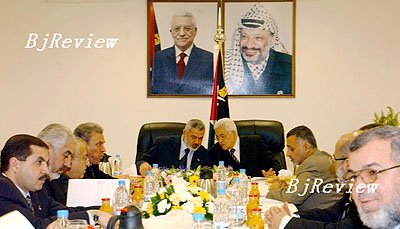
The Palestinian Legislative Council approved the agreement reached by the Palestinians' two major political factions, Hamas and Fatah, on forming a national unity government on March 17. The unity government came as a compromise among various political forces inside and outside of Palestine, in which Saudi Arabia played a pivotal role. The announcement not only is symbolically conducive to ending the turmoil in the territory but also has injected new impetus into the stalled Middle East peace process. However, given the many uncertainties that affect this deep-seated issue, achieving peace in the Middle East is still an uphill battle.
The hard-line Hamas government has been subjected to a joint boycott by Israel, the United States and the European Union (EU) since it took power early last year. As a result, the Palestinians' living conditions deteriorated, a trend that to some extent weakened the political base of Hamas. With armed conflicts breaking out frequently, Hamas and Fatah were embroiled in an ever-fiercer power struggle, which it was feared could escalate into a civil war.
The persistent turbulence in Palestinian society also hindered the progress of the nation's liberation. These pressing concerns prompted the two blocs to seek reconciliation in their bid to win external support so that they could restart peace talks with Israel and establish an independent Palestinian country.
Hamas and Fatah began to negotiate over a national unity government in June last year. The negotiations were shelved several times because of their conflicting views. On February 8 this year, they finally signed an agreement in Mecca, Saudi Arabia, in which their consensus on forming a unity government was enshrined. However, they encountered a setback shortly afterward when Prime Minister Ismail Haniyeh of Hamas put forward tough conditions for the resignation of his cabinet: A 5,600-member special security force should be formed; the interior minister should be named before the Hamas government stepped down; Hamas should have the right to nominate three independent cabinet ministers, while Fatah should have the right to nominate two, rather than the other way around as stated in the Mecca agreement.
In this context, Iranian President Mahmoud Ahmadinejad visited Saudi Arabia on March 3. Leaders of the two countries reached a limited consensus on regional affairs. Iran promised to persuade Hamas to not to set up any barriers in forming a national unity government. As a reward, Saudi Arabia would help Iran improve its relations with the United States. Three days later, Ahmadinejad called on Hamas to stop fighting with Fatah, properly address internal affairs with courage and strength, and continue to struggle against Israel in a meeting with Khaled Mashaal, the political leader of Hamas. Under the pressure of Saudi Arabia and Iran, the two rival factions both compromised, thereby finalizing a plan for the new cabinet on March 14.
Under this plan, Haniyeh continues to serve as the prime minister, while Azam al Ahmad, who heads Fatah's parliamentary bloc, was named vice prime minister. Hamas takes up 12 out of the 24 cabinet posts, including the three independent ministers nominated by it. Fatah takes up eight posts, including the two independent members nominated by it. Other factions share the remaining four posts. The posts of interior, foreign and finance ministers were given to independent politicians.
To sum up, the unity government represents a consummation of the joint efforts made by various parties. It resulted from the compromise of major Palestinian factions. It is also a telling example of the interaction of the big powers that can exert influence over the Middle East. These distinct characteristics set the course for its future.
|
